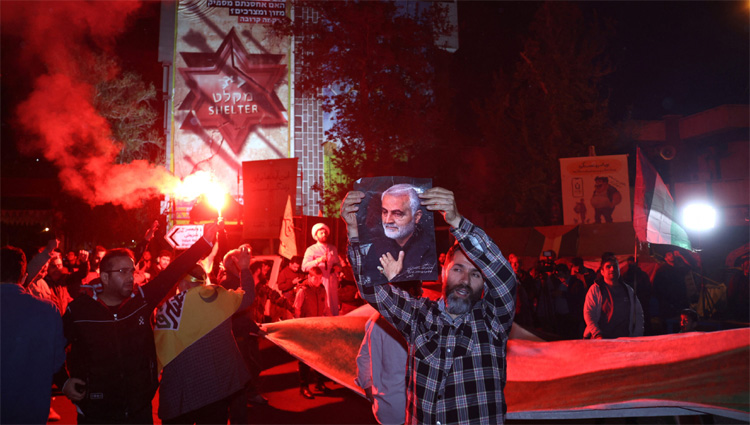Is an Iran strike on Israel inevitable? Experts from Tehran weigh in
Iranian President Masoud Pezeshkian stated on Monday that Tehran would “definitely” retaliate against Israel for the assassination of Hamas political leader Ismail Haniyeh. Pezeshkian emphasised that while Iran does not intend to escalate war and crisis in the region, Israel will face consequences for its actions. This statement was made during a meeting with Russia’s security council secretary, Sergei Shoigu.
Iran’s acting foreign minister also joined the chorus of voices calling for retribution against Israel on Thursday, telling AFP that Israel made a costly “strategic mistake” by assassinating the Hamas chief in Tehran. “The act that the Zionists carried out in Tehran was a strategic mistake because it will cost them gravely,” Ali Bagheri said.
Meanwhile, Israel vowed to “eliminate” newly appointed Hamas leader Yahya Sinwar, who is accused of orchestrating the October 7 attack. His appointment has further escalated regional tensions as the Gaza war has reached its 11th month. Speaking at a military base on Wednesday, Prime Minister Benjamin Netanyahu said Israel was “determined” to defend itself. “We are prepared both defensively and offensively,” he told new recruits.
Shedding light on the possibility of an all-out regional conflagration, Dr. Seyed Hadi Borhani, Assistant Professor of Middle East Studies, Tehran University, told Hindustan Times, “Iran is deeply affected by the recent assassination and is determined to make Israel pay a steep price for this serious act of aggression. And to achieve this, Iran has several options at its disposal.
“One approach mirrors the operation it conducted in mid-spring in response to Israeli actions against its consulate in Damascus. During that operation, Iran launched over 300 drones and ballistic missiles targeting military bases in Israel, resulting in damage to at least two air bases, one fatality, and numerous injuries.”
Last week, US Defence Secretary Lloyd J. Austin III directed military movements to support Israel in case of an attack and to prepare for potential strikes on US forces by Iran-backed groups as part of anticipated retaliation. A senior Pentagon official stated that some American warships currently in the Mediterranean will be repositioned closer to Israel’s coast.
Highlighting Tehran’s readiness to retaliate against Israel, Borhani stated, “Iran has more advanced drones and missiles that weren’t used in that attack but could be deployed in future operations. There’s also a growing possibility that Iran might launch a coordinated, multi-pronged assault with its regional allies, especially Lebanon’s Hezbollah and Yemen’s Ansarullah. This seems more likely now, given that these groups, like Iran, have recently vowed to retaliate after Israeli strikes on Beirut and the port of Hodeidah in Yemen.”
In April, following an Israeli airstrike on the Iranian consulate in Damascus that killed several military commanders, Iran’s supreme leader, Ayatollah Ali Khamenei, used his Eid al-Fitr sermon to liken Israel’s attack on the diplomatic site to an assault on Iranian territory and promised retaliation for the “mistake” made by Israel. Shortly thereafter, Iran launched 300 drones and long-range missiles towards Israel.
This was the first direct attack from Iranian soil, bypassing the use of proxies in Iraq, Syria, or Lebanon. Despite a response from Israeli jets and air defenses, supported by American, British, French, and Jordanian forces, which intercepted most of the incoming projectiles, the sight of missiles over the Dome of the Rock, one of Islam’s holiest sites, showed the potential for an escalating conflict.
However, discussing how Israel has “crossed several red lines” this time, Hamidreza Gholamzadeh, Secretary General of Asian Mayors Forum, remarked, “Iran wants to maintain a regional balance of power so that it doesn’t fall in favour of Israel. A few months ago, after an attack on its consulate in Syria, Iran launched a missile strike against Israel to rebalance the situation. This response was meant to show Iran’s capability and determination to retaliate strongly against any aggression.
“So, previously, Iran’s actions were more symbolic. It showed Iran could strike without causing major damage or casualties. But the recent attack on a key figure in Tehran indicates a shift: Iran now views the situation as more critical, with this attack crossing several red lines.”
Gholamzadeh indicated that a military action is likely, potentially involving a multi-front attack against Israel, rather than a one-time strike or an intelligence operation like previous efforts. He emphasised that Iran will not accept any mediation or forgiveness, as the issue concerns not only its national interest and security but also the security of the entire region.
“If Iran does not respond, there would be further attacks by Israelis and it would escalate the tensions. Israelis have anyway failed to stand against Hamas for the past 10 months in military areas. So, they adhere just to killing civilians, women and children in thousands and thousands.
“Even the US cannot help them against Iran because the Americans are strongly avoiding having boots on the ground here. They might offer intelligence and weaponry support, but they can’t engage on the ground. They struggled in Iraq and Afghanistan for over 20 years, so they can’t stand against Iran.

